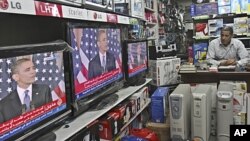How disappointed are Arabs in the policies of the United States since President Barack Obama took office? The answer: very.
The Arab American Institute (AAI) released the findings of the latest AAI/Zogby International poll findings conducted in six Arab nations: Egypt, Saudi Arabia, Morocco, United Arab Emirates, Jordan and Lebanon. The poll was commissioned after President Obama's State Department address on the popular uprisings in the Arab world two months ago. More than 4,000 Arab citizens were surveyed.
Related video:
After a remarkable improvement in U.S. popularity in the Arab world with the election of President Obama in 2008, favorable ratings of the U.S. across the Arab world have plummeted even lower than where they were at the end of the Bush Administration.
For example, favorability ratings dropped from 26 percent in 2008 to 12 percent in 2011 in Morocco and from 9 percent to 5 percent in Egypt. The only exception was in Saudi Arabia where U.S. ratings improved from 13 percent to 30 percent because of the United States’ strong stance against Iran. On average, President Obama’s favorable ratings across the Arab world are now 10 percent or less.
| 2008 | 2011 | |
| Egypt | 9 | 5 |
| Jordan | 16 | 10 |
| KSA | 13 | 30 |
| Lebanon | 21 | 23 |
| Morocco | 26 | 12 |
| UAE | 22 | 12 |
Why did Arabs lose faith?
James Zogby, President of the Arab American Institute, co-commissioned the poll and helped analyze the findings. He said the drop of President Obama’s popularity in the Arab world was primarily due to the sentiment among Arabs that the U.S. president has not met their expectations as outlined in his historic speech on U.S. relations with the Arab world. That speech was delivered in Cairo in June 2009.
“As we just saw when the president laid down the 1967 borders as a basis for resuming the Israeli-Palestinian peace negotiations, he was confronted by the [Republicans] in Congress who invited Israeli Prime Minister to come to Congress and reject the president’s initiative,” said Zogby.
“The president is facing a partisan block that is preventing him from making a difference, whether in solving the Arab-Israeli conflict or providing enough U.S. aid to help secure a successful transition to democracy with the Arab spring,” he added.
According to the poll, in five out of the six countries surveyed, the U.S. was viewed less favorably than Turkey, China, France or Iran.
Far from seeing the U.S. as a leader in the post-Arab spring environment, the countries surveyed viewed “U.S. interference in the Arab world” as the greatest obstacle to peace and stability in the Middle East, second only to the continued Palestinian occupation.
Zogby says that while American democracy is still admired by Arabs, U.S. policy in the region has increasingly undermined Arab attitudes toward America as a global model. In terms of countries most admired by Arab citizens, Turkey, under the leadership of Prime Minister Tayyip Erdogan, tops the approval rating list when it comes to model foreign policy.
Is polling empowering?
Zogby International has been conducting polls in the Arab world for nearly a decade. In addition, to providing feedback to the United States government as to how Arabs are feeling, Zogby International President John Zogby says polling can play a role in the Arab world’s burgeoning democracies and to give the region a sense of self awareness.
“We’ve been polling in difficult places and there is an atmosphere where people want to give their opinions, such as Egypt - which is perhaps one of the most difficult places in the world - and Saudi Arabia,” he said. “We saw people giving opinions via social media. Anybody who is active, engaged and aware want to know, 'How connected am I?” Where do my opinions fit in? Am I in the two percent, the 40 percent or the 85 percent?' It’s empowering because it gives people connectivity.”
John Zogby also said that other polls conducted by his firm show that Arab Americans are becoming more connected to the events of the Arab spring and politically engaged, which may impact the U.S. political landscape in coming months. He said that Arab Americans can also convey to countries in democratic transition like Tunisia and Egypt that democracy is an imperfect process.
“Our democracy wasn’t built in a day,” said Zogby. “We had an American revolution and our first form of government did not work. In fact, it was a miserable failure and had to be revised. There’s still strong disagreement about the constitution. It did not provide for the enfranchisement of African Americans or women. It was imperfect and this process is imperfect. But it’s headed in the right direction. Be patient and be willing to drive where it takes you.”
U.S. support for the Arab Spring
One might expect a more favorable rating of the U.S. and its president following American support for the Arab spring and flowering democracy in the region, but the poll suggests this is not happening.
“The majority of Arabs said it is too early to tell whether the Arab world will be better after the Arab spring, “said James Zogby. “Most respondents even in Egypt are not giving credit to the US in supporting their revolution. They feel they were the ones that made it happen with or without US blessings.”
James Zogby argues that there are two key elements that may help change the Arab peoples’ attitude toward the U.S.: solving the Arab –Israeli conflict and providing economic assistance via U.S. foreign direct investment to help create jobs in post revolution Arab countries.
The poll suggests that across the board, resolving the Israeli-Palestinian issue is the most important factor that could improve Arab attitudes toward the U.S.





